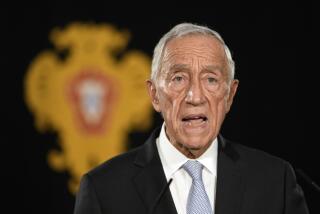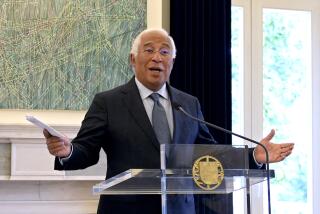Pressed to Cut 1,200% Inflation, Brazil’s Economic Chief Quits
- Share via
RIO DE JANEIRO — For the second time in two months, Brazilian President Itamar Franco’s drive to rapidly cure the country’s chaotic economy has resulted in the resignation of the country’s economic chief.
Facing a public ultimatum from Franco to push down Brazil’s 1,200% annual inflation and kick-start its stagnant economy within three months, Finance Minister Paulo Haddad quit on Monday. Gustavo Loyola, president of the Central Bank, also stepped down.
The news sent Brazilian markets into a tailspin and left economic observers worrying about the future of Brazil’s economic liberalization program and its ability to stave off further economic deterioration. The stock market plunged 5.6% in Sao Paulo and 3.7% in Rio. The cruzeiro lost 1.6% of its value against the dollar.
“The president wants more emphasis on policies promoting economic growth and at the same time wants to reduce inflation,” said Carlos Langoni, a Rio de Janeiro-based economist and former president of the Central Bank. “As most people know, these two goals cannot be achieved at the same time, at least rapidly.”
Haddad, caught between Franco’s increasingly angry calls for lower inflation and faster growth, told aides the main reason he quit was the president’s push for price controls and an immediate reduction in interest rates.
Franco, who took office in early October after Fernando Collor de Mello was impeached on corruption charges, also refused to consult Haddad on key appointments to the Central Bank and publicly criticized his proposed policies.
Despite a series of anti-inflation and pro-growth shock plans in recent years, Brazilian inflation has shot up from 255% a year in 1985 to 1,200% today. In the same period, annual economic growth has dropped to zero from 8%.
Haddad’s predecessor, Gustavo Krause, resigned under similar circumstances Dec. 15. Previously, Haddad had been Franco’s minister of planning.
“Franco really knows nothing about economics,” said Alexander Barros, president of Early Warning, a Brasilia-based analyst. “His goals are contradictory, and Haddad had no choice but to resign. I’m afraid Brazil has wasted the time and effort it spent trying to stabilize the economy under Collor.”
Haddad was replaced by Eliseu Rezende, an engineer and former president of several state-owned industries. The biggest worry being expressed about the new appointment is that Rezende is not an economist.
More to Read
Sign up for Essential California
The most important California stories and recommendations in your inbox every morning.
You may occasionally receive promotional content from the Los Angeles Times.













